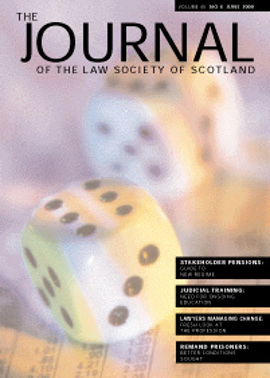Shaping new law in Scotland
The Law Society of Scotland and many other concerned organisations welcomed the inclusion of the Adults with Incapacity (Scotland) Bill in the legislative programme of the first session of the Scottish Parliament. For many, the introduction of the Bill was the final stage of a 12-year campaign which sought to address the disadvantages and problems experienced by those who are among the most vulnerable in society.
In “Law Reform in the 21st. Century: A Manifesto for Change”, the Society highlighted the grave injustice which existed in a legal system which allowed vulnerable people to be disadvantaged as a result of mental health problems or disability. The previous law was complex, costly and removed many adults with some degree of capacity from the decision-making process completely.
The Adults with Incapacity Bill sought to address these issues and create a framework which reflected three main principles - that any intervention in an adult’s life should be for his or her benefit and be achieved in the least restrictive way; that the adult’s past and present wishes should be taken into account; and that adults should be encouraged to use their existing skills and learn and develop new ones.
The Bill was introduced in the Scottish Parliament on 8th. October 1999 and was allocated to the Justice and Home Affairs Committee (JHAC) for consideration. The Committee then took evidence on the principle of the Bill from a number of interested parties and organisations, including the Society. The findings of the Committee were then debated in the Scottish Parliament and the Bill passed Stage 1 in December 1999.
January 2000 saw the beginning of the intense line-by-line scrutiny of the Bill by JHAC. At Stage 2 of the Bill procedure, amendments can be tabled for debate by the lead Committee. The Ministers responsible for the Bill are also present during the Stage 2 debates, to put forward the position of the Scottish Executive in relation to the amendments. The Society promoted a number of amendments to the Bill at this stage, some of which were successful in altering the wording of the Bill, and others in which the principle will be taken forward and applied in regulation or guidance.
It was at Stage 2 that the value of the Committee structure of the Scottish Parliament was most apparent. The members of the Committee, and the Ministers worked together in a spirit of openness towards a common goal - to make better law which relates to the needs of Scottish people today.
On 29th March 2000 the Bill was passed by a plenary session of the Scottish Parliament and has now received Royal Assent. The Society wishes to congratulate the Scottish Executive, the Alliance for the Promotion of the Incapable Adults Bill and all those involved in bringing this important piece of legislation to the statute books.
Despite the passing of the Adults with Incapacity (Scotland) Bill, the Law Reform team continues to be busy. The Society proposed amendments at Stage 2 and Stage 3 of the Abolition of Feudal Tenure Bill, which was passed by the Scottish Parliament on 3rd May and now awaits Royal Assent. Representations were also made regarding the Abolition of Poindings and Warrant Sales Bill, the Standards in Schools (Scotland) Bill, the National Parks (Scotland) Bill and the Freedom of Information Bill. Representatives from the Society’s Legal Aid Committee gave evidence to the Justice and Home Affairs Committee on Wednesday, 3rd May 2000, raising concerns about the Scottish Executive Budgetary proposals while representatives from the Criminal Law and Judicial Procedure Committees also gave evidence recently on the Bail, Judicial Appointments etc. (Scotland) Bill.
The Society is looking closely at the terms of the Regulation of Investigatory Powers (Scotland) Bill and gave evidence to the Scottish Parliament on this subject in May.
This past year has seen an increased workload for the Society as well as for many other organisations in Scotland who are committed to improving Scots law. With a packed parliamentary timetable for the year ahead, life on the hill looks set to be as busy as ever - and the Law Reform team are ready to meet the challenge.






